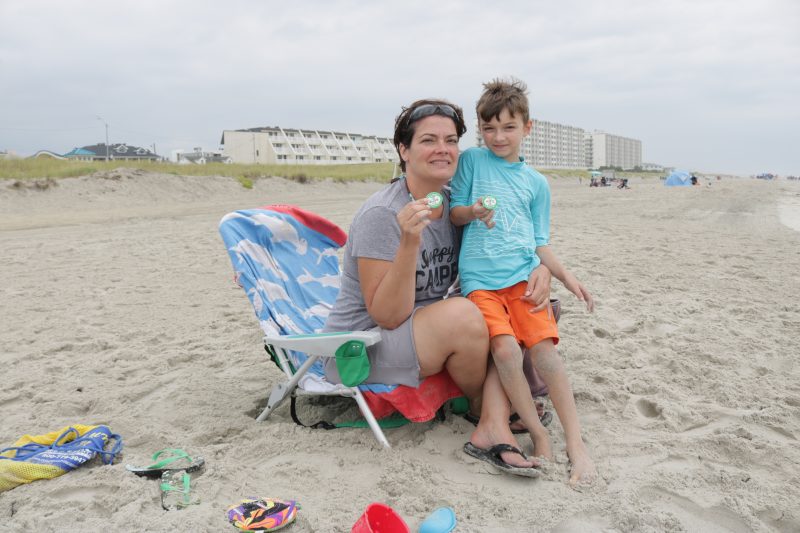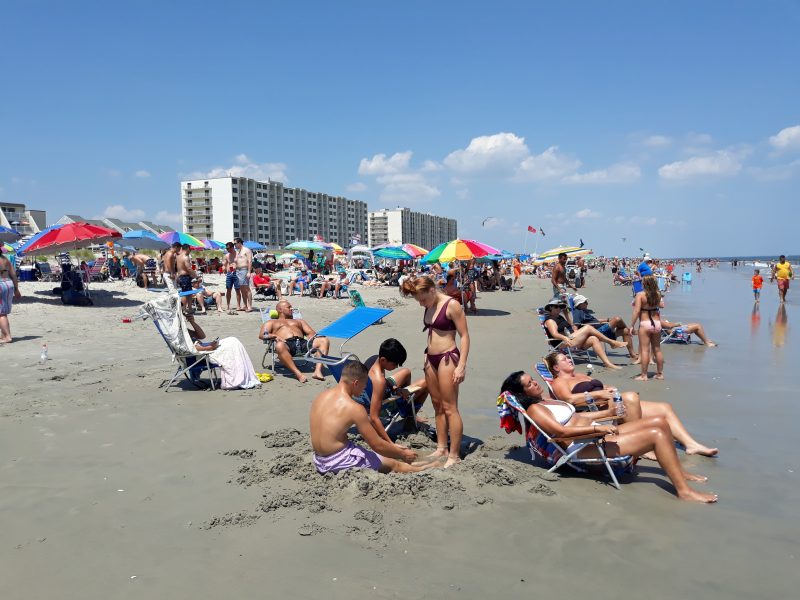Michelle Vassallo, a Sea Isle City vacationer from Washington, D.C., and her 7-year-old son, Alex, hold up the family's beach tags last summer.
 By DONALD WITTKOWSKI
When it comes to beach tag sales, weather is always the X-factor.
Sea Isle City is enjoying an increase in beach tag sales this summer thanks in large part to the sunny, sultry weather that is luring vacationers to the shore.
“I do think we’ve had the best weather in years,” said Paula Doll, Sea Isle’s chief financial officer. “Weather is a strong driver.”
Through Aug. 12, the city had $1,325,425 in beach tag sales, up $11,880 over the same period in the summer of 2018.
“We’re doing pretty good,” City Business Administrator George Savastano said in a beach tag report to City Council during its meeting Tuesday.
Beach tags are required until Labor Day, giving Sea Isle the rest of August to rake in some more revenue. People have the choice of buying daily, weekly or seasonal tags.
Year after year, beach tag sales are a key barometer of the strength of the summer tourism season. In Sea Isle’s case, the all-time record was set in 2015 with $1,471,321 in beach tag revenue.
Beach tag sales also broke the $1.4 million barrier in 2016, 2017 and 2018, but fell slightly shy of 2015’s record number.
By DONALD WITTKOWSKI
When it comes to beach tag sales, weather is always the X-factor.
Sea Isle City is enjoying an increase in beach tag sales this summer thanks in large part to the sunny, sultry weather that is luring vacationers to the shore.
“I do think we’ve had the best weather in years,” said Paula Doll, Sea Isle’s chief financial officer. “Weather is a strong driver.”
Through Aug. 12, the city had $1,325,425 in beach tag sales, up $11,880 over the same period in the summer of 2018.
“We’re doing pretty good,” City Business Administrator George Savastano said in a beach tag report to City Council during its meeting Tuesday.
Beach tags are required until Labor Day, giving Sea Isle the rest of August to rake in some more revenue. People have the choice of buying daily, weekly or seasonal tags.
Year after year, beach tag sales are a key barometer of the strength of the summer tourism season. In Sea Isle’s case, the all-time record was set in 2015 with $1,471,321 in beach tag revenue.
Beach tag sales also broke the $1.4 million barrier in 2016, 2017 and 2018, but fell slightly shy of 2015’s record number. Summer crowds are enjoying the sunny weather on Sea Isle's beaches.
Although weather is the dominant factor that generates beach tag sales, a healthy economy also helps out, Doll noted.
“If people are able to take time to come down, that doesn’t hurt,” she said of beach-goers choosing Sea Isle as their vacation destination.
Revenue generated by beach tag sales is an important source of funding for the city. It covers the cost of keeping the beaches clean, collecting the trash, employing lifeguards and hiring summer police officers. The revenue also helps to pay for the city’s beach replenishment projects, Doll explained.
With beach tag revenue absorbing the cost, local taxpayers are saved from having to pay for all of those things, she said.
Michelle Vassallo, a summer vacationer from Washington, D.C., who was enjoying a Tuesday afternoon on Sea Isle’s beaches with her 7-year-old son, Alex, said she doesn’t mind having to pay for beach tags as long as the revenue is put to good use.
“I think the cleanliness of the beaches and having lifeguards for so many people here are the most important things,” Vassallo said.
Beach tags, though, are not required every day in Sea Isle. For at least 25 years, Sea Isle has been offering visitors a free day on the beach each Wednesday as an extra incentive for them to come to town. The only exception is if the Fourth of July falls on a Wednesday, like in 2018.
Katherine Custer, Sea Isle’s public information officer, said the free beach days are particularly popular with school groups and summer camps that are looking to save some money.
Summer crowds are enjoying the sunny weather on Sea Isle's beaches.
Although weather is the dominant factor that generates beach tag sales, a healthy economy also helps out, Doll noted.
“If people are able to take time to come down, that doesn’t hurt,” she said of beach-goers choosing Sea Isle as their vacation destination.
Revenue generated by beach tag sales is an important source of funding for the city. It covers the cost of keeping the beaches clean, collecting the trash, employing lifeguards and hiring summer police officers. The revenue also helps to pay for the city’s beach replenishment projects, Doll explained.
With beach tag revenue absorbing the cost, local taxpayers are saved from having to pay for all of those things, she said.
Michelle Vassallo, a summer vacationer from Washington, D.C., who was enjoying a Tuesday afternoon on Sea Isle’s beaches with her 7-year-old son, Alex, said she doesn’t mind having to pay for beach tags as long as the revenue is put to good use.
“I think the cleanliness of the beaches and having lifeguards for so many people here are the most important things,” Vassallo said.
Beach tags, though, are not required every day in Sea Isle. For at least 25 years, Sea Isle has been offering visitors a free day on the beach each Wednesday as an extra incentive for them to come to town. The only exception is if the Fourth of July falls on a Wednesday, like in 2018.
Katherine Custer, Sea Isle’s public information officer, said the free beach days are particularly popular with school groups and summer camps that are looking to save some money.